On May 26, 2019, I found myself on a very bumpy school bus riding away from the airport in Belize City and heading towards Orange Walk District. It was in Orange Walk, specifically the jungles of the Rio Bravo Conservation Area, where I spent the next four weeks excavating potential ancient Maya structures with Dr. Stan Walling’s field school, the Rio Bravo Archaeological Survey. Without the awarded funding from Newcomb-Tulane College, I would not have gained the knowledge that can be obtained from a hands-on archaeology field school.
As a volunteer student, I had the opportunity to learn how to set up a unit, or designated area of interest in the land to excavate. Setting a unit requires one to take precise measurements and calculate some basic mathematics. By the last week of the field school, I had the pleasure of assisting in a unit set up at a location that has never been excavated in before. Being one of the first students to create a unit and begin excavating in the middle of a potential Maya ballcourt was one of the highlights of my time at the Rio Bravo field school. The field school taught us other archaeology tasks such as: measuring and recording elevations of a unit; proper sample handling, collecting, and labeling; schematic plan view and profile view mapping.
One of the most important skills I acquired was learning to properly document everything. Notes were taken daily and each student had a chance to be the recorder to write what our finds were, interpretations of these finds, and generally our progress throughout the day. These notes would be used as a reference for Dr. Walling to make his own interpretations. Also, each lot, or level, of a unit had its own designated form that specifically noted the soil matrix, characteristics of the lot, and any finds. My time as a recorder was very extensive due other students in my group lacking the desire to take notes. The reason I standby note taking as the most important skill learned is because without documentation of an excavation one is not an archaeologist, one is then a simple looter.
My time as an amateur archaeologist this summer has been the most rewarding work I have done in my academic career thus far. I would not have been able to attend this field school if it was not for the awarded funding from Newcomb-Tulane College. The funding enabled me to cover the cost of travel expenses to and from Belize. Without the contribution towards my project, I would not have been able to gain such an eye-opening experience. The experience itself and the multiple professionals in various fields I have met truly put into perspective the options I have as an anthropology major. I have been introduced to multiple possible academic and career paths. The entire experience has made me very excited for my archaeology course in the fall and more prepared to continue pursuing my degree.
Written by Lindsey Bollat, Dean’s Grant recipient, 2018-2019

